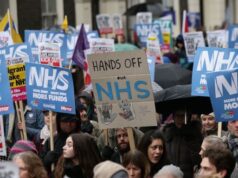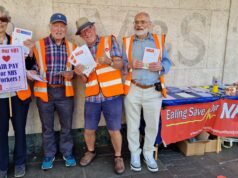NHS England is planning to rip up key provisions of the 2012 Health & Social care Act and bring in yet another disastrous re-organisation.
Ealing Save Our NHS explains what’s going on and why we oppose it in this response to the official consultation.
Response to NHS England Consultation on:
“INTEGRATING CARE: NEXT STEPS TO BUILD STRONG AND EFFECTIVE INTEGRATED CARE SYSTEMS ACROSS
ENGLAND”
Ealing Save Our NHS subscribes to the widespread view that the NHS reorganisation Health and Social Care Act 2012 has not been fit for purpose. The current proposals may be an attempt to remedy the situation but our view is that they will undermine the public service ethos of the NHS in several ways.
The document entitled “Integrating Care” makes claims that existing Integrated Care Systems, or ICS have been successful. Our experience of the ICS in North West London is the opposite. The unsupported assertion by NHS England that ICS are successful seems to us like somebody marking their own homework.
With no apparent statutory basis, the North West London ICS appears to have taken control of NHS budgets, laid down parameters for Trusts and taken leadership of the CCGs. It seems as though this document is a call for Parliament to rubberstamp what has already been put in place.
REMOVAL OF ACCOUNTABILITY AND TRANSPARENCY
This sidestepping of democracy is reflected in the proposals. There is no accountability, ICS meetings are to be held in secret, apparently without the public being able to attend or even see minutes.
Local authorities are not to be part of ICS in their role as elected representatives of the public. Instead a couple of Local Authority officers are to take part on behalf of several Councils and merely acting in their role as Managers.
The only involvement of the public is that controlled by the ICS themselves i.e. official consultations, focus group type arrangements, ‘citizens panels’ and the like.
Despite many references to involvement, in reality the public and their elected representatives are to be firmly excluded. Even the non – elected, privately run and generally toothless Healthwatch bodies have only a token mention.
In contrast, there is nothing in place to prevent profit making private health companies from taking part in the ICS and policy decisions should they succeed in winning certain contracts in the future.
It is clear to us that the preferred Option 2 would be even less transparent and accountable than Option 1, since it would give all control to the secretive ICS
BOTTOM UP OR TOP DOWN MANAGEMENT
Inexplicably, paragraph 1.1 claims that ICS are a bottom up approach – the very opposite of the actuality which is a centralisation of policy, function, control and finance.
At the heart of the ICS will be a free hand to invent frameworks for delivering health services in their region of England and to allocate fixed budgets for such delivery. Such decisions will be within a framework to be set in turn by NHS England.
We see this is as a huge step away from decisions being made by clinicians. Claims that policy will be clinically driven are not borne out by the detail of the proposals. In reality those few senior clinicians involved in the ICS will become primarily managers, open to being viewed by their colleagues as career motivated or even autocratic.
Although “Integrating Care” is peppered with claims such as “enabling NHS organisations, local councils, frontline professionals and others to join forces to plan and provide around residents’ needs as locally as possible” the plan does the very opposite. In reality it changes the balance of decision making, moving away from clinicians and front line staff towards the ICS centralised management. There would be centralised financial straitjackets and inevitably an increase in centralised measurement of targets.
The vision for the workforce in 2.16 clearly undermines the ethos of public service in favour of a business style view of staff motivated by career goals and meeting targets. Those who fit in may be rewarded; those who use their initiative outside of official targets may be at risk of becoming demoralised.
MOVING AWAY FROM COMMUNITIES
The ICS areas are big regions, each including many varied geographic and social communities. For many years the NHS has evolved to meet the needs of their local communities, employing staff locally and addressing local needs. Despite the claims to the contrary, it’s clear that this is to be undermined. Services will be assessed at Regional ICS level, more remotely than they are now. Indeed some so-called ‘specialist’ services are to be directly controlled by ICS for the whole region.
If you have no money, you can’t afford to travel miles to a hospital. If you have different treatment in different locations, or you are a parent or a carer for someone who does, you may fail to access treatment. If you have no relationship with overworked staff providing the treatment or the admin allocating the treatment, you may fail to access it.
A MOVE TOWARDS MORE INEQUALITY
Even at this early stage, regionally centralised ICS policies are already obscuring the reality of social needs and social discrimination.
Despite the good intentions of those involved, decision makers are simply unaware of the impact of their decisions. Their plans and strategies inevitably brush aside needs that they are unaware of and are not readily quantifiable.
Alongside this is a vision of a move towards Individualisation of Health Care –“put the citizen at the centre of their care”. This is a view of care that might appeal to the young, the well-educated, the articulate and the computer savvy. Others will be left behind.
The model of individualised care will of course be popular with the wealthy, those who can supplement their healthcare with private provision.
Individualised care, driven by digital and data is a model that facilitates finance driven management. It is a system based on targets, moving away from decisions by local clinicians. There are of course exiting possibilities of selective use of online and digital, but this should be to supplement one to one care, not to reduce it as “Integrating Care” may imply.
Strangely, GP practices are hardly mentioned in the “Integrating Care” consultative document, though they will be greatly affected. It seems to us that although unstated, underlying the document is a continuation of the policy to move services “into the community”. Perhaps there is an unstated hope that hard pressed GP practices and online support can somehow substitute for a reduction of local service provision and the move away from holistic local hospital treatment. If so, we think that would be disastrous.
We see no serious attempt to do more than pay lip service to the issue of health inequalities. The promise of some sort of future “needs based allocation formula” only serves to convey a lack of understanding or commitment.
Oliver New
Chair, Ealing Save Our NHS
Info@ealingsaveournhs.org.uk
8 January 2021
https://ealingsaveournhs.org.uk/wp-content/uploads/2021/02/ESON-response-to-NHSE-consultation-on-ICS.pdf
- ‘Fixing’ the NHS – Why Labour’s Plan Won’t Work
- GP Crisis – Why Patients should support GPs in their Collective Action
- Goodbye Tories – Hello Labour – What’s in Store for the NHS?
- The General Election: it’s time to get the NHS we want and need!
- Some Good News but GP Access Service still under threat




